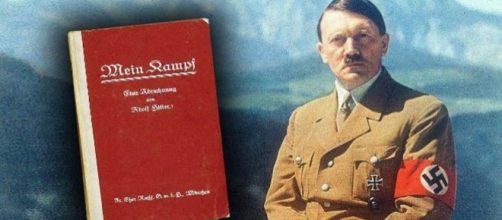After World War II, copyright for "Mein Kampf" (My Struggle), Adolf Hiter's notorious manifesto, was handed over to the Bavarian government by the Allies. Under this copyright, publication of the work was banned in Germany. In January 2016, however, the 70 year copyright expired, and a revised scholarly edition of "Mein Kampf" was released in Germany by the Institute of Contemporary History (IfZ). The IfZ set out only 4,000 copies in the initial print run, but stated Tuesday that their edition has sold over 85,000 copies to date. "Mein Kampf" even managed to claw its way to the number one non-fiction slot on Der Spiegel in April.
"These sales have overtaken us, so really no one could count," stated IfZ director Andreas Wirsching to Spiegel Online. A sixth print run is scheduled for this coming month.
'Mein Kampf' reprint sparks controversy
Unsurprisingly, the re-release of the inflammatory text led to major outcry from a number of groups, particularly members of the Jewish-German community. Written by Hitler during a stint in jail following a failed coup attempt in the early days of the nazi movement, "Mein Kampf" not only outlines the youth and upbringing of the future leader of the Nazi Party, but lays the background and basis for the anti-Semitic, extremist views that would come to define Nazi Germany and its leader, views which eventually led to the Holocaust and World War II.
Despite the backlash from the Jewish community and others, Wirsching was optimistic about the re-release. He stated that the text was reprinted as a scholarly, critical edition by the IfZ in part to get a leg-up on far-right sympathizers who would begin to release their own editions of the manifesto after the expiration of the copyright. "It would be irresponsible to just let this text spread arbitrarily," he informed the German news agency DPA. In fact, a right-wing publisher based in the German city of Leipzig is currently under investigation for potentially violating anti-propaganda laws through a release of their own "Mein Kampf" reprint.
Although many insisted that the reappearance of the work on German shelves would only fuel xenophobia and support for authoritarian-style regimes in a time when the country is embroiled in its own refugee turmoil, Wirsching said he and the IfZ had a different perspective on bringing back the infamous text.
"Discussions about Hitler’s worldview and dealing with his propaganda presented an opportunity, at a time when authoritarian political beliefs and far-right slogans are again gaining in popularity, to re-examine the ominous roots and results of such totalitarian ideologies," Wirsching said to the New York Times. Regardless of what the opponents of its revival have to say, "Mein Kampf" is back in Germany, and one can only hope Wirsching is right about the reasons behind its surprising success.

